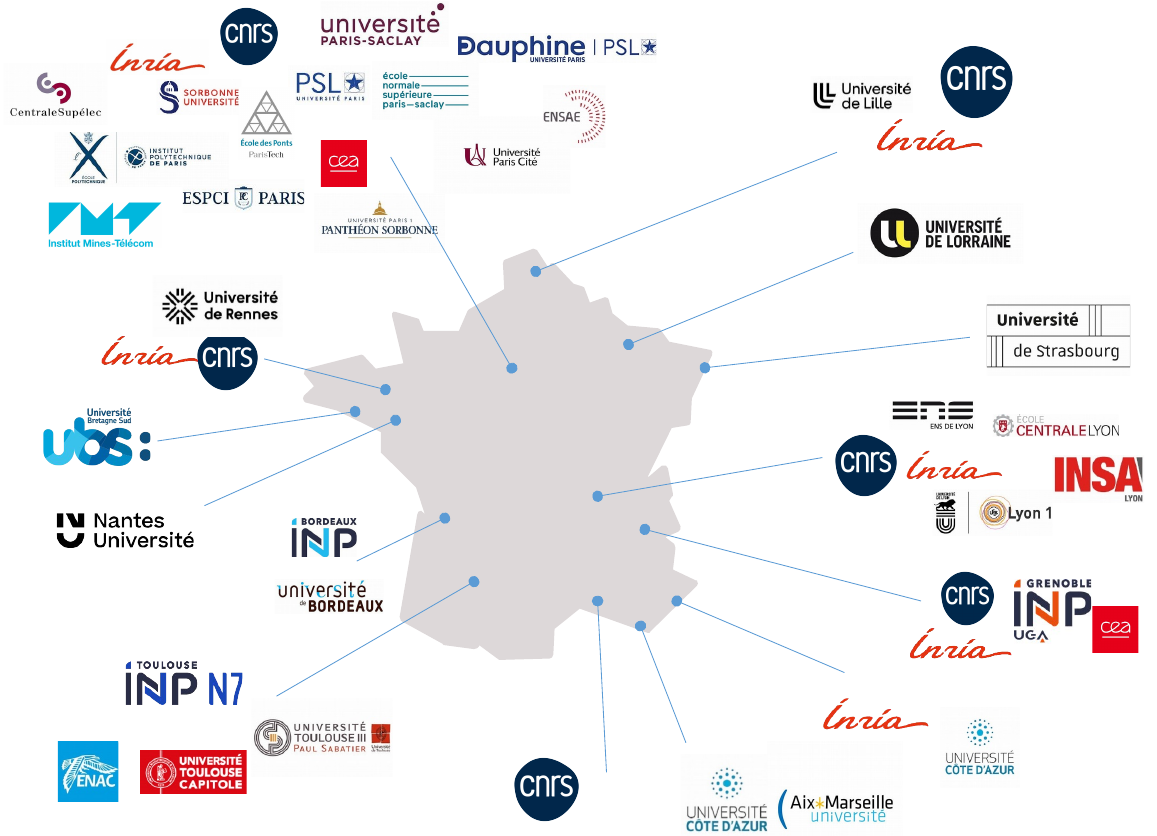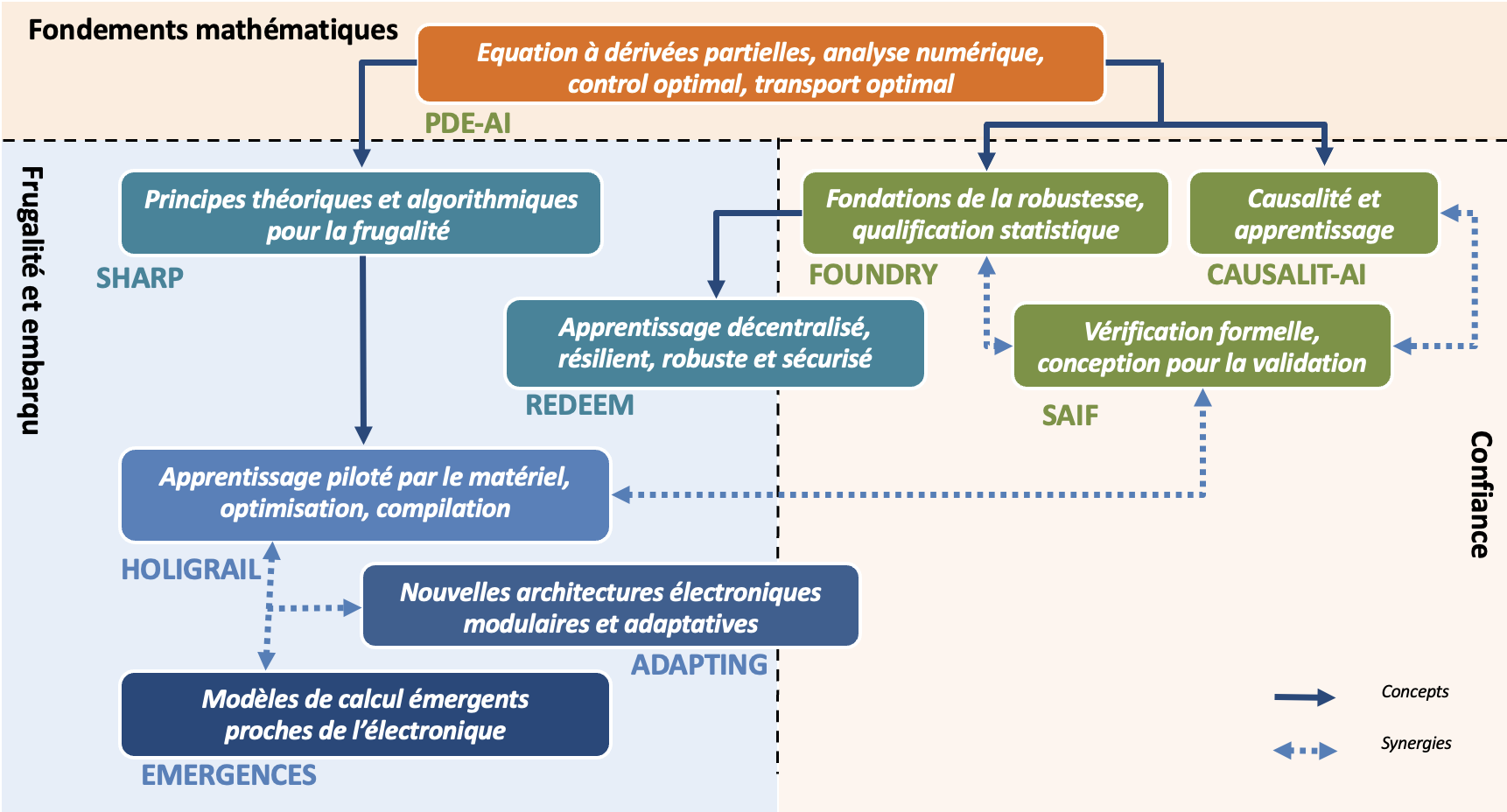PEPR IA: Fundamental research projects to support the national AI strategy.
In order to position France's sustainably on the global AI stage, the government has launched a new phase of the national strategy for artificial intelligence as part of France 2030. At the heart of this strategy's fundamental research component is the creation of the 73M€ Priority Research Program and Equipment (PEPR) on AI. In a mission letter received on December 14, 2022, CEA, CNRS and Inria were entrusted with its implementation, with two months to set up a program designed to structure French research communities, launch stimulating scientific challenges, and bring out breakthrough technologies benefiting all French players in the field.
The PEPR's objectives, clearly specified in its mission statement, are as follows:
- Lift the scientific barriers to frugal AI (in terms of energy and data efficiency), embedded AI, distributed AI and trusted AI (in terms of robustness, fairness, transparency and security).
- Leverage the excellence of the French mathematics school to open up new horizons for the mathematical foundations of AI;
- Enhance France's attractiveness to AI talent;
- Pave the way for the involvement of French industry, and startups in particular, in the deployment of AI.
History of the program
The three "pilots" in charge of this organization were François Terrier for CEA, Jamal Atif for CNRS, and Marc Schoenauer for Inria, member of the joint A&O/TAU team with LISN. They launched an express national consultation, via all of the more or less official structures of the community (GDs, 3IA institutes as well as coordinators of unsuccessful 3IA candidates and self-proclaimed AI institutes, for example). The 252 feedbacks were then digested by the pilots, assisted by an ad hoc committee of experts (Francis Bach, Gabriel Peyré, Ian O'Connor, Frédéric Pétrot and Patrick Sayd), who extracted 9 project topics, each backed by sufficient critical mass. Each of the 9 consortia then wrote a project of a few pages.
These projects, together with the scoping document (written by the pilots), were sent to the ANR National Research Agendcy in mid-March 2022, validated by a committee of independent experts in early summer 2022, and then by ANR in the fall. The consortia then wrote the long versions of their projects, which were sent to ANR in March-April 2023, and after a few trips back-and-forth, all the projects were contracted in the fall of 2023. These projects bring together more than 50 research teams, respecting delicate institutional and geographical balances, and will hire more than 150 PhD students over the next 5 or 6 years, more than half of whom will be co-supervised by two teams from the same project. More details on the 9 projects, as well as on the PEPR governance, are available on the PEPR website
Project activities
Two other calls for projects, drafted by the pilots with the help of the same committee of experts, and currently being examined by ANR, will complement the nine projects already underway. One call targets mathematics teams who are not yet aware that their specialties could well be very useful in advancing the fundamentals of AI. The other call targets colleagues in the Humanities and Social Sciences, for cross-fertilization with computer science teams. These two calls will also address Generative AI, which was still confidential at the time of the PEPR's creation, but has literally exploded since then.
Another aspect of the PEPR program is the so-called "Attractivity" chairs, designed to attract foreign AI talents to France, or French talents who have fled to better conditions, along the lines of the Choose France chairs. Here again, the first call for proposals is currently being drafted.
Finally, throughout the life of the PEPR and its projects, part of the budget will be devoted to animating the community, in collaboration with existing structures (organization of annual national days, thematic meetings on PEPR themes, and of course project activity reports). Another part of the budget will be devoted to the pre-maturation of projects, in collaboration with SATTs and other pre-maturation/maturation institutes.

Map of involved institutions of PEPR IA

Themes of the the 9 projects of PEPR IA